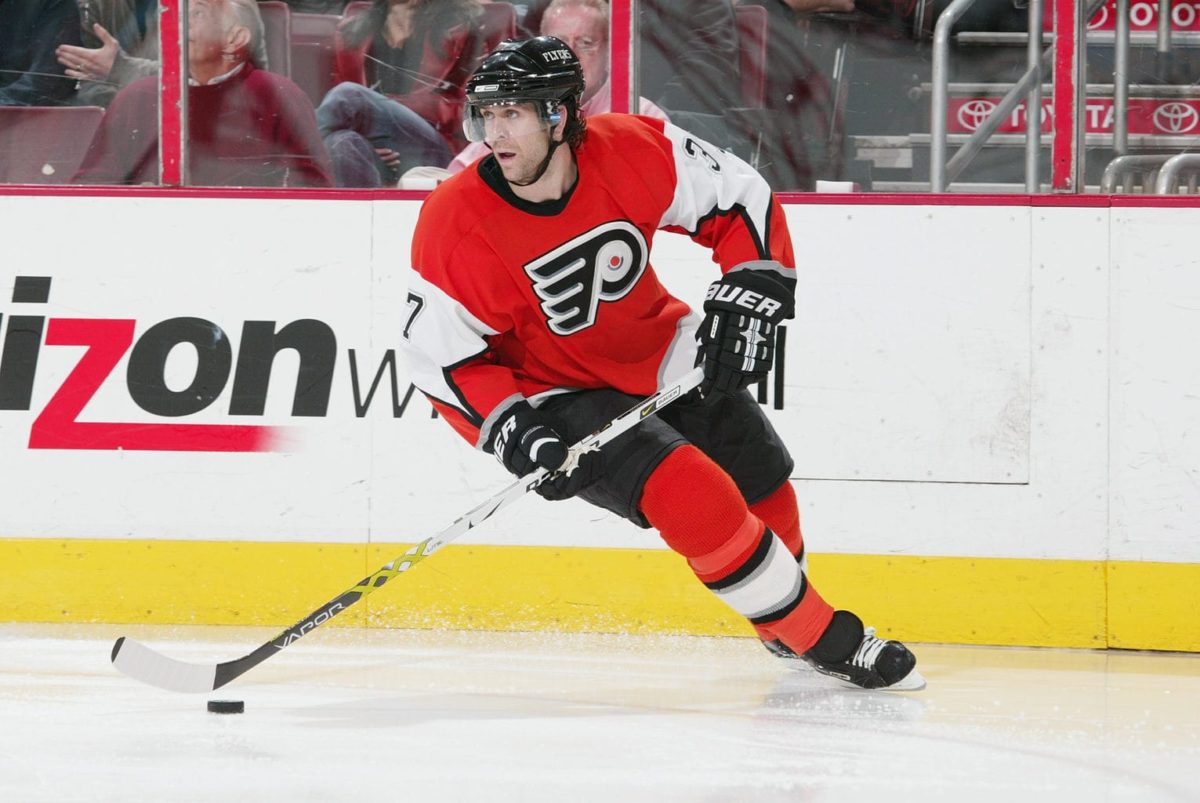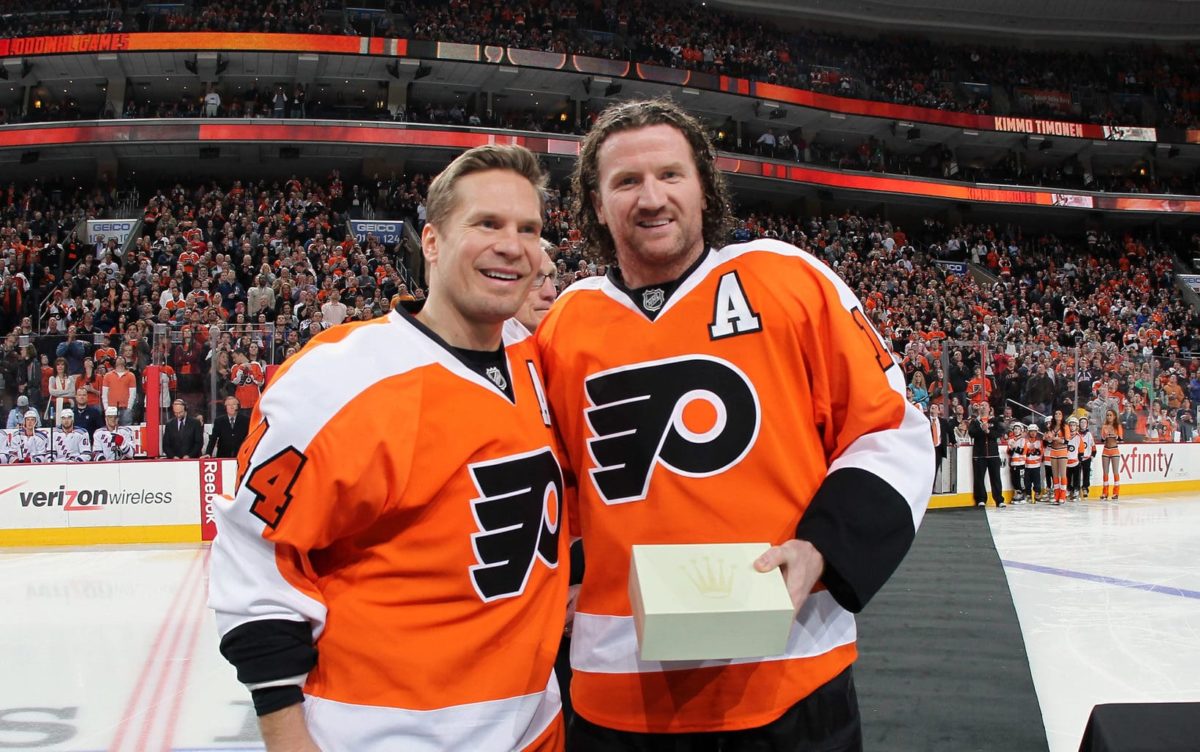The Philadelphia Flyers have had many great individual seasons from their defensemen since the 1999-00 NHL season. From that point forward, which defenders have had the best campaigns for the Orange and Black?
Eric Desjardins (1999-00)
By the time we reached the cutoff date for this list, Eric Desjardins was 30 years of age. However, his age didn’t stop him from having one of the best seasons of his career. With many great campaigns in his 30s to pick from, his 1999-00 season was arguably his best. Finishing fourth in Norris Trophy voting, he just missed out on being a finalist for the award. If there is a defender who defined the Flyers of the 1990s and 2000s, he is it.

Averaging 26:47 of ice time in 81 games, Desjardins never took a night off. We don’t have his advanced stats to put his numbers into better context, but his regular season totals speak for themselves – only Hockey Hall of Famers Nicklas Lidstrom, Chris Pronger, and Rob Blake had more points.
Desjardins’ 55 points and plus-20 rating helped his Flyers cruise to a 45-win, 105-point season and finish atop the Eastern Conference with the third-best record in the league. A fantastic two-way defender, he was a big reason why the Flyers finished second in goals against.
Desjardins was also the backbone of the Flyers’ defense in the 2000 Playoffs when he averaged 28 minutes of ice time per game. Without superstar Eric Lindros in the first 16 games of the postseason, he was one of the de facto leaders who helped the team to a 3-1 series lead in the Eastern Conference Final. Unfortunately, he and the Flyers lost the series to the New Jersey Devils in heartbreaking fashion, but he was one of Philadelphia’s best players.
With 12 points in 18 playoff games, Desjardins was a huge part of their run. It might not have ended in a Stanley Cup, but he and his teammates gave the eventual Stanley Cup champion Devils a run for their money.
Chris Pronger (2009-10)
At 35, Chris Pronger was the anchor of the Flyers’ defense in 2009-10. Averaging 25:56 of ice time, his success was directly related to the team’s. For a club that clinched a playoff spot in their last game of the season, every bit of his campaign was needed to make that happen.

Pronger’s 55 points and plus-22 rating were impressive considering the team finished with 88 points. He was so good that, for a while, many people attributed the success of young defender Matt Carle to the veteran’s efforts. Individually, he was phenomenal.
Among 212 defensemen with 500 or more minutes played, Pronger ranked 15th in points per 60, 67th in individual expected goals for per 60 (ixG/60), 58th in individual Corsi for per 60 (iCF/60), and 65th in individual Fenwick for per 60 (iFF/60). He wasn’t firing pucks at an unprecedented rate, but he was still shooting much more than most.
Related: Advanced Stats: Corsi and Fenwick – What Do They Mean?
Of the 302 defensive pairings that played 100 or more minutes together in the 2009-10 regular season, Pronger’s ranked 61st in expected goals for percentage (xGF%) at 55.9 percent. His pairing ranked fifth in ice time in the league, and he dealt well with the heavy workload, outplaying most of his opponents.
In the postseason, Pronger was arguably better. In the Flyers’ run to the Stanley Cup Final, he scored 18 points in 23 games averaging 29:03 of ice time. The Orange and Black fell short of a championship, but his efforts gave them a chance in the first place.
Kimmo Timonen (2012-13)
There are many seasons to pick from, but the shortened 2012-13 NHL campaign was arguably Kimmo Timonen’s best as a Flyer. At 37 years of age, he was still one of the best defensemen in the league. He didn’t lead the Flyers to a playoff berth, but he did receive a few Norris Trophy votes for his efforts.

Timonen, acquired in a trade with the Nashville Predators a few seasons prior, had aged like fine wine for the Orange and Black. He was in his 30s throughout his time in Philadelphia and arguably played some of his best hockey the older he got.
He was a terrific defensive player, but his offensive numbers were impressive that season. He ranked in the top 50 among defensemen with 500 or more minutes played in points per 60, ixG/60, iCF/60, and iFF/60. In goals above expected, he finished with a minus-0.1 rating, meaning his terrific campaign was more than sustainable and not a factor of luck. With 29 points in 45 games, he had one of the best offensive seasons of his long career.
A significant amount of Timonen’s offensive production came on the power play, but he was still one of the best all-around defensemen at 5-on-5. Ranking just a bit lower in all of the statistics mentioned at 5-on-5 alone, he was among the elite in almost any situation.
Of the 215 defensive pairings that played 100 or more minutes together in 2012-13, Timonen’s ranked 53rd in expected goals against per 60 (xGA/60) at 1.78, and his pairing ranked 35th out of 215 with a 57.1 xGF%.
On a defense that lacked depth due to an injury that would ultimately lead to Pronger’s retirement, Timonen was unable to do all of the work himself and the team’s desperate moves to try and replace his teammate went awry. That didn’t stop the 37-year-old from showing the league that he still had some fuel left in the tank, continuing to defy how age impacts players in the NHL.
Shayne Gostisbehere (2015-16)
It could be argued that no defenseman in the history of the Flyers had a more magical run than Shayne Gostisbehere in 2015-16. He was so good that season that he should have been in the conversation for the Hart Trophy, leading his team to the postseason after a slow start without him.

Before a 22-year-old Gostisbehere was in the equation, the Flyers started the 2015-16 season with a 5-8-3 record. When he returned, the team started to turn things around. In his first game, he scored his first of four overtime-winning goals that season, tied with Scott Niedermayer for the most in a single season by a defender. With 17 goals and 29 assists in just 64 games, he became an elite offensive defenseman right out of the gates.
Starting on Jan. 19, 2016, Gostisbehere went on an unprecedented run, scoring a point in 15 games in a row, a record among rookie defensemen. His efforts helped clinch a playoff berth in the Flyers’ second-last game of the season. The team lost to the Washington Capitals in six games, losing all their offensive mojo, but the rookie defender made it all possible. He finished as the runner-up in the Calder Trophy race and finished 17th in Norris Trophy voting.
Among defensemen who played 500 or more minutes in 2015-16, Gostisbehere ranked first in goals per 60, points per 60, third in ixG/60, fourth in iCF/60, and third in iFF/60. His 6.3 goals above expected were unsustainable, but that is a testament to how badly the Flyers needed him. With the next-best player finishing with just 2.2, the Flyers were more than happy to have him.
While defense has been a struggle for the Flyers at times, they have had some electrifying seasons since the start of the 2000s. All of these defenders were crucial pieces to the team’s success in those years.
